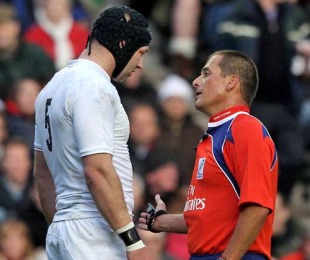|
The East Terrace
Law changes to spell end of boredom
James Stafford
March 26, 2010

"I don't like your hat Steve, that's a penalty against white."
© Getty Images
Enlarge
News has emerged from Dublin that the IRB is considering major changes to rugby's law book and to how the game is refereed. Despite the recent controversy surrounding the IRB's decision to change the 'interpretation' of the tackle law midway through the 2010 Six Nations championship and the general failure of the ELVs, the law makers are looking to make more dramatic changes in the very near future. "We just can't stop fiddling with things," said IRB law assessor Stuart Rees, "I'll be honest, we've gotten quite a taste for it. We have some more great ideas planned. It's quite exciting and we are confident that these new laws will help to make the game more thrilling for the television audience we are so keen to entertain. "We've haven't really asked top level coaches from the northern hemisphere, but we did ask a few from Australia and several coaches from the Super 14. Furthermore, we even tried a few laws out in some Australian schoolboy matches, so it isn't like we are doing this half-baked or anything. These have been tried out in proper matches as one of those schoolboy games was a regional quarter-final cup match. So between those trials and our discussion with the Super 14 coaches I think it is fair to say we have really pushed the boat out in the trial and consultation process." The proposed shake-up could be the biggest overhaul in rugby laws for several seasons and it is believed TV bosses are thrilled with the news. The biggest and most controversial measure could be that referees may be instructed to change interpretation of various laws, such as the tackle and breakdown area, during an actual match. Officials are talking of reserving the right to inform the match officials (via the radio system currently in use) to use various different interpretations within the same game. "It's about speeding the game up," a spokesman said. "TV needs tries and more tries. Television is the beast that is never satisfied. We need to adjust our style as is suitable for the occasion. So, for example, if the pre-March 2010 interpretation suits a particular tackle situation in which the attacking team have a good chance of scoring, we can let the referee know, via the headset radio system, to use that set of interpretations. If, however, we feel the defenders may have too much of an edge, we could consider asking the referee to use a post-March 2010 law interpretation to referee the tackle area. We need to be pragmatic and use whatever works best for those watching who want to see more scores and less boring stuff such as mauls, scrums and lineouts." The law changes are bound to be controversial and the IRB claim they have refrained from going too far and making what they consider to be extreme changes. "We did toy with the idea of enforcing the law regarding the scrum put in. With some radical feedback we have had we thought that from after the World Cup we may ask scrum-halves to put the ball in roughly around the middle of where the two front rows meet when they engage. It was seriously debated among top referees, but then we thought about it and it might be too drastic and decided to keep the current interpretation of the law whereby the scrum half is allowed by the officials to place the ball at the feet of the second-rows. We aren't sure if our television audiences are ready for such radical changes which would possibly lead to far too much competition at scrum time." Other proposals being considered by the IRB include:
© Scrum.com James Stafford is editor of The East Terrace (www.theeastterrace.com) - an offside view of life in the rugby world
|
Live Sports
Communication error please reload the page.
-
Football
-
Cricket
-
Rugby
-
- Days
- Hrs
- Mins
- Secs
F1 - Abu Dhabi GP
Abu Dhabi Grand Prix December 11-131. Max Verstappen ()
2. Valtteri Bottas (Mercedes)
3. Lewis Hamilton (Mercedes)
4. Alexander Albon ()
5. Lando Norris ()
6. Carlos Sainz Jr ()
-
ESPNOtherLive >>
Golf - Houston Open
Snooker - China Open
Tennis - Miami Open

